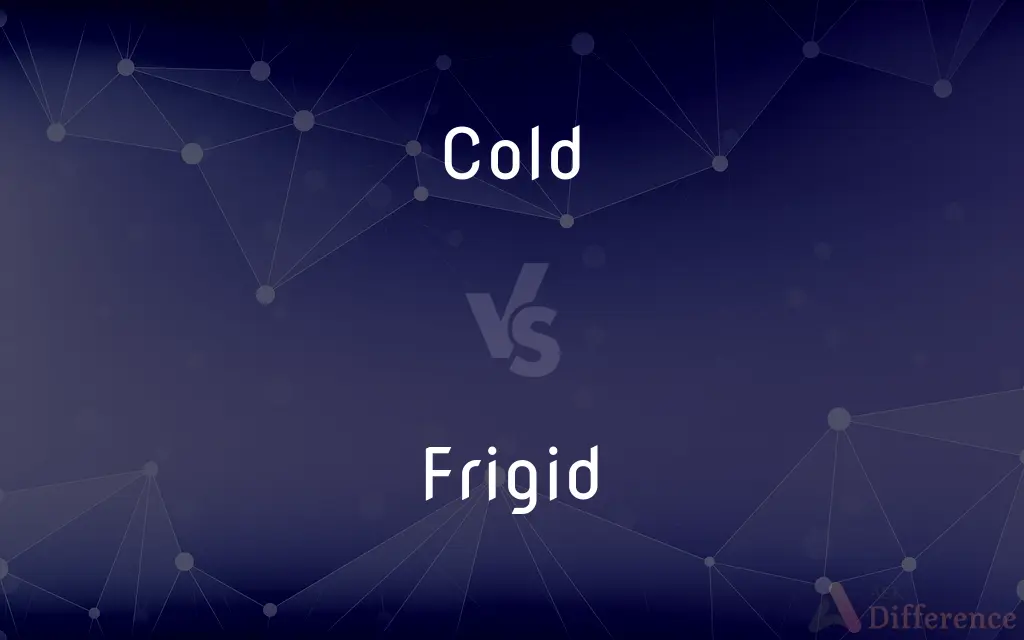Cold vs. Frigid — What's the Difference?
Edited by Tayyaba Rehman — By Fiza Rafique — Updated on March 27, 2024
Cold refers to a low temperature, generally unpleasant but manageable, while frigid describes an extreme cold that can be hazardous.

Difference Between Cold and Frigid
Table of Contents
ADVERTISEMENT
Key Differences
Cold is a term used to describe lower temperatures that are noticeably below what is considered comfortable or warm, often associated with the need for additional clothing or heating. Frigid, on the other hand, denotes a much more severe level of cold, typically used to describe temperatures that are dangerously low, potentially causing frostbite or hypothermia if adequate protection is not used.
While cold weather can be subjective and vary according to individual tolerance and geographical location, with some people finding temperatures in the 50s (Fahrenheit) cold, frigid temperatures are universally recognized as extreme, often falling well below freezing point. This distinction highlights the relative nature of "cold" versus the absolute, often life-threatening conditions implied by "frigid."
In terms of environmental impact, cold temperatures can slow down plant growth, require more energy for heating, and influence daily activities and clothing choices. Frigid temperatures, however, can lead to the cessation of plant life, burst pipes, infrastructure damage, and significant challenges to wildlife survival. The severity associated with frigid conditions necessitates more substantial protective measures, including specialized clothing, infrastructure adaptations, and emergency preparedness.
Culturally, the concept of cold can vary significantly, with societies closer to the equator perceiving lower temperatures as more intense compared to those in northern latitudes who might find the same temperatures mild. Conversely, frigid conditions are universally acknowledged for their potential danger, often inspiring awe and respect for nature’s extremes, regardless of geographical location.
Weather forecasts often use "cold" to prepare individuals for lower temperatures that might require a jacket or sweater, while "frigid" is used to warn of dangerous conditions that require significant precautions, underscoring the different levels of response and preparation needed for each.
ADVERTISEMENT
Comparison Chart
Temperature Range
Low but above freezing.
Well below freezing, extreme cold.
Perception
Relative to individual and location.
Universally recognized as severely cold.
Environmental Impact
Slows plant growth, increased heating needs.
Can halt plant life, cause infrastructure damage.
Safety Concerns
Minimal, generally manageable with proper clothing.
High, risk of frostbite and hypothermia.
Cultural Significance
Varies by geographical location.
Universally acknowledged for potential danger.
Compare with Definitions
Cold
Characterized by a lower temperature that is not extreme.
The cold weather made her shiver, but a warm jacket was enough to keep her comfortable.
Frigid
Refers to extremely low temperatures that can be hazardous.
The frigid Arctic temperatures require specialized survival gear.
Cold
Can vary widely in perception.
What's considered cold in one region might be mild in another.
Frigid
Necessitates significant protective measures.
In frigid weather, layers of thermal clothing are essential.
Cold
Generally manageable without severe risk to health.
Staying active helps to ward off the cold.
Frigid
Poses serious health risks without proper protection.
Exposure to frigid temperatures can lead to frostbite within minutes.
Cold
Requires some heating and additional clothing.
The cold evenings prompted them to light the fireplace.
Frigid
Is universally recognized and not subjective.
Frigid conditions are known to cause mechanical failures.
Cold
Affects daily life and activities to a degree.
The cold weather brought everyone indoors earlier than usual.
Frigid
Often leads to emergency situations and requires preparedness.
They stocked up on supplies in anticipation of the frigid forecast.
Cold
Cold is the presence of low temperature, especially in the atmosphere. In common usage, cold is often a subjective perception.
Frigid
Extremely cold.
Cold
Having a low temperature
Cold water.
Frigid
Lacking warmth of feeling.
Cold
Being at a temperature that is less than what is required or what is normal
Cold oatmeal.
Frigid
Stiff and formal in manner
A frigid refusal to a request.
Cold
Chilled by refrigeration or ice
Cold beer.
Frigid
Showing little or no enthusiasm
Scientists gave the new theory a frigid reception.
Cold
Feeling no warmth; uncomfortably chilled
We were cold sitting by the drafty windows.
Frigid
Very cold; lacking warmth; icy.
Cold
Appearing to be dead; unconscious
Found him out cold on the floor.
Frigid
Chilly in manner; lacking affection or zeal; impassive.
Cold
Dead
Was cold in his grave.
Frigid
Cold; wanting heat or warmth; of low temperature; as, a frigid climate.
Cold
Lacking emotion; objective
Cold logic.
Frigid
Wanting warmth, fervor, ardor, fire, vivacity, etc.; unfeeling; forbidding in manner; dull and unanimated; stiff and formal; as, a frigid constitution; a frigid style; a frigid look or manner; frigid obedience or service.
Cold
Having little appeal to the senses or feelings
A cold decor.
Frigid
Wanting natural heat or vigor sufficient to excite the generative power; impotent.
Cold
Designating or being in a tone or color, such as pale gray, that suggests little warmth.
Frigid
Extremely cold;
An arctic climate
A frigid day
Gelid waters of the North Atlantic
Glacial winds
Icy hands
Polar weather
Cold
Not affectionate or friendly; aloof
A cold person.
A cold nod.
Frigid
Devoid of warmth and cordiality; expressive of unfriendliness or disdain;
A frigid greeting
Got a frosty reception
A frozen look on their faces
A glacial handshake
Icy stare
Wintry smile
Cold
Exhibiting or feeling no enthusiasm
A cold audience.
A cold response to the new play.
A concert that left me cold.
Cold
Having lost all freshness or vividness through passage of time
Dogs attempting to catch a cold scent.
Cold
So intense as to be almost uncontrollable
Cold fury.
Cold
Characterized by repeated failure, especially in a sport or competitive activity
The team fell into a slump of cold shooting.
Cold
To an unqualified degree; totally
Was cold sober.
Cold
With complete finality
We turned him down cold.
Cold
Without advance preparation or introduction
Took the exam cold and passed.
Walked in cold and got the new job.
Cold
Relative lack of warmth
Cold slows down chemical reactions.
Cold
The sensation resulting from lack of warmth; chill.
Cold
A condition of low air temperature; cold weather
Went out into the cold and got a chill.
Cold
A viral infection characterized by inflammation of the mucous membranes lining the upper respiratory passages and usually accompanied by malaise, fever, chills, coughing, and sneezing. Also called common cold, coryza.
Cold
(of a thing) Having a low temperature.
A cold wind whistled through the trees.
Cold
(of the weather) Causing the air to be cold.
The forecast is that it will be very cold today.
Cold
(of a person or animal) Feeling the sensation of coldness, especially to the point of discomfort.
She was so cold she was shivering.
Cold
Unfriendly; emotionally distant or unfeeling.
She shot me a cold glance before turning her back.
Cold
Dispassionate; not prejudiced or partisan; impartial.
Let's look at this tomorrow with a cold head.
He's a nice guy, but the cold facts say we should fire him.
The cold truth is that states rarely undertake military action unless their national interests are at stake.
Cold
Completely unprepared; without introduction.
He was assigned cold calls for the first three months.
Cold
Unconscious or deeply asleep; deprived of the metaphorical heat associated with life or consciousness.
I knocked him out cold.
After one more beer he passed out cold.
Cold
(usually with "have" or "know" transitively) Perfectly, exactly, completely; by heart; down pat.
Practice your music scales until you know them cold.
Try both these maneuvers until you have them cold and can do them in the dark without thinking.
Rehearse your lines until you have them down cold.
Keep that list in front of you, or memorize it cold.
Cold
(usually with "have" transitively) Cornered; done for.
With that receipt, we have them cold for fraud.
Criminal interrogation. Initially they will dream up explanations faster than you could ever do so, but when they become fatigued, often they will acknowledge that you have them cold.
Cold
(obsolete) Not pungent or acrid.
Cold
(obsolete) Unexciting; dull; uninteresting.
Cold
Affecting the sense of smell (as of hunting dogs) only feebly; having lost its odour.
A cold scent
Cold
(obsolete) Not sensitive; not acute.
Cold
Distant; said, in the game of hunting for some object, of a seeker remote from the thing concealed. Compare warm and hot.
You're cold … getting warmer … hot! You've found it!
Cold
(painting) Having a bluish effect; not warm in colour.
Cold
(databases) Rarely used or accessed, and thus able to be relegated to slower storage.
Cold
(informal) Without compassion; heartless; ruthless.
I can't believe she said that...that was cold!
Cold
(informal) Not radioactive.
Cold
(firearm) Not loaded with a round of live ammunition.
Cold
Without electrical power being supplied.
Cold
A condition of low temperature.
Come in, out of the cold.
Cold
A harsh place; a place of abandonment.
The former politician was left out in the cold after his friends deserted him.
Cold
(medicine) A common, usually harmless, viral illness, usually with congestion of the nasal passages and sometimes fever.
I caught a miserable cold and had to stay home for a week
Cold
(slang) rheum, sleepy dust
Cold
At a low temperature.
The steel was processed cold.
Cold
Without preparation.
The speaker went in cold and floundered for a topic.
Cold
In a cold, frank, or realistically honest manner.
Cold
Deprived of heat, or having a low temperature; not warm or hot; gelid; frigid.
Cold
Lacking the sensation of warmth; suffering from the absence of heat; chilly; shivering; as, to be cold.
Cold
Not pungent or acrid.
Cold
Wanting in ardor, intensity, warmth, zeal, or passion; spiritless; unconcerned; reserved.
A cold and unconcerned spectator.
No cold relation is a zealous citizen.
Cold
Unwelcome; disagreeable; unsatisfactory.
Cold
Wanting in power to excite; dull; uninteresting.
What a deal of cold business doth a man misspend the better part of life in!
The jest grows cold . . . when in comes on in a second scene.
Cold
Affecting the sense of smell (as of hunting dogs) but feebly; having lost its odor; as, a cold scent.
Cold
Not sensitive; not acute.
Smell this business with a sense as coldAs is a dead man's nose.
Cold
Distant; - said, in the game of hunting for some object, of a seeker remote from the thing concealed.
Cold
The relative absence of heat or warmth.
Cold
The sensation produced by the escape of heat; chilliness or chillness.
When she saw her lord prepared to part,A deadly cold ran shivering to her heart.
Cold
A morbid state of the animal system produced by exposure to cold or dampness; a catarrh.
Cold
To become cold.
Cold
A mild viral infection involving the nose and respiratory passages (but not the lungs);
Will they never find a cure for the common cold?
Cold
The absence of heat;
The coldness made our breath visible
Come in out of the cold
Cold is a vasoconstrictor
Cold
The sensation produced by low temperatures;
He shivered from the cold
The cold helped clear his head
Cold
Used of physical coldness; having a low or inadequate temperature or feeling a sensation of coldness or having been made cold by e.g. ice or refrigeration;
A cold climate
A cold room
Dinner has gotten cold
Cold fingers
If you are cold, turn up the heat
A cold beer
Cold
Extended meanings; especially of psychological coldness; without human warmth or emotion;
A cold unfriendly nod
A cold and unaffectionate person
A cold impersonal manner
Cold logic
The concert left me cold
Cold
Having lost freshness through passage of time;
A cold trail
Dogs attempting to catch a cold scent
Cold
(color) giving no sensation of warmth;
A cold bluish gray
Cold
Marked by errorless familiarity;
Had her lines cold before rehearsals started
Cold
No longer new; uninteresting;
Cold (or stale) news
Cold
So intense as to be almost uncontrollable;
Cold fury gripped him
Cold
Feeling or showing no enthusiasm;
A cold audience
A cold response to the new play
Cold
Unconscious from a blow or shock or intoxication;
The boxer was out cold
Pass out cold
Cold
Of a seeker; far from the object sought
Cold
Lacking the warmth of life;
Cold in his grave
Common Curiosities
What precautions are necessary for frigid weather?
Significant precautions like layered clothing, heating, and minimizing exposure are necessary to avoid health risks.
How do frigid temperatures affect the environment?
Frigid temperatures can halt plant growth, damage infrastructure, and severely impact wildlife.
Can cold weather be harmful?
While typically not harmful, cold weather without adequate protection can lead to discomfort and minor health issues.
Is the perception of cold the same worldwide?
No, perception of cold varies greatly depending on geographical location and individual tolerance.
How do societies adapt to cold vs. frigid climates?
Societies adapt to cold climates with heating and clothing, but frigid climates require more extensive measures, including special architecture and emergency preparedness.
What is the main difference in response to cold and frigid forecasts?
Cold forecasts may require added warmth, while frigid forecasts demand extensive measures to protect against severe risks.
Can technology mitigate the risks of frigid temperatures?
Yes, advances in clothing, heating, and infrastructure have made living in frigid conditions more manageable.
Why are frigid temperatures considered dangerous?
Frigid temperatures pose a high risk of frostbite, hypothermia, and other cold-related health issues.
What defines a temperature as cold?
Cold temperatures are those that fall below comfortable living conditions but are generally above freezing.
Are there health benefits to cold exposure?
Moderate cold exposure can boost immunity and metabolism, but benefits diminish as temperatures become frigid and risks increase.
Can plants survive in frigid conditions?
Some plants are adapted to survive frigid conditions through mechanisms like antifreeze proteins, but many cannot withstand extreme cold.
What are the economic impacts of frigid temperatures?
Frigid temperatures can lead to increased energy demand, infrastructure damage, and disruptions in transportation and services, affecting the economy.
How do cold and frigid temperatures affect outdoor activities?
Cold temperatures may require additional preparation for outdoor activities, while frigid temperatures often prohibit many outdoor activities entirely.
What industries are affected by cold and frigid temperatures?
Industries such as agriculture, construction, and energy are significantly impacted by cold and frigid temperatures.
How do animals adapt to frigid conditions?
Animals adapt through behaviors like hibernation, migration, and physical adaptations like thicker fur.
Share Your Discovery

Previous Comparison
Deductible vs. Excess
Next Comparison
Arabic vs. UrduAuthor Spotlight
Written by
Fiza RafiqueFiza Rafique is a skilled content writer at AskDifference.com, where she meticulously refines and enhances written pieces. Drawing from her vast editorial expertise, Fiza ensures clarity, accuracy, and precision in every article. Passionate about language, she continually seeks to elevate the quality of content for readers worldwide.
Edited by
Tayyaba RehmanTayyaba Rehman is a distinguished writer, currently serving as a primary contributor to askdifference.com. As a researcher in semantics and etymology, Tayyaba's passion for the complexity of languages and their distinctions has found a perfect home on the platform. Tayyaba delves into the intricacies of language, distinguishing between commonly confused words and phrases, thereby providing clarity for readers worldwide.














































